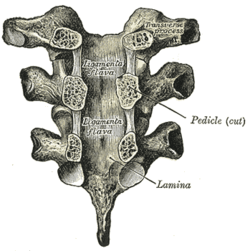Ligamenta flava
| Ligament: Ligamenta flava | ||
|---|---|---|
 | ||
| Vertebral arches of three thoracic vertebrae viewed from the front | ||
 | ||
| Median sagittal section of two lumbar vertebrae and their ligaments | ||
| Latin | Ligamenta flava (singular: ligamentum flavum) | |
| Gray's | p.290 | |
| From | ||
| To | ||
| MeSH | A02.513.514.287 | |
| Dorlands/Elsevier | l_09/12492241 | |
The ligamenta flava (singular, ligamentum flavum, Latin for yellow ligament) are ligaments of the spine.
They connect the laminae of adjacent vertebrae, all the way from the second vertebra, axis, to the first segment of the sacrum. They are best seen from the interior of the vertebral canal; when looked at from the outer surface they appear short, being overlapped by the lamina of the vertebral arch.
Each ligament consists of two lateral portions which commence one on either side of the roots of the articular processes, and extend backward to the point where the laminae meet to form the spinous process; the posterior margins of the two portions are in contact and to a certain extent united, slight intervals being left for the passage of small vessels. Each consists of yellow elastic tissue, the fibers of which, almost perpendicular in direction, are attached to the anterior surface of the lamina above, some distance from its inferior margin, and to the posterior surface and upper margin of the lamina below.
In the neck region the ligaments are thin, but broad and long; they are thicker in the thoracic region, and thickest in the lumbar region.
Function
Their marked elasticity serves to preserve the upright posture, and to assist the vertebral column in resuming it after flexion. The elastin prevents buckling of the ligament into the spinal canal during extension, which would cause canal compression.
Clinical relevance
Hypertrophy of this ligament may cause spinal stenosis because it lies in the posterior portion of the vertebral canal.
References
This article incorporates text from a public domain edition of Gray's Anatomy.
External links
| ||||||||||||||||||||||||||||||||||||||||||||||||||||||||||||||||||||